Related Research Articles

Tennessee, officially the State of Tennessee, is a landlocked state in the Southeastern region of the United States. Tennessee is the 36th-largest by area and the 15th-most populous of the 50 states. It is bordered by Kentucky to the north, Virginia to the northeast, North Carolina to the east, Georgia, Alabama, and Mississippi to the south, Arkansas to the southwest, and Missouri to the northwest. Tennessee is geographically, culturally, and legally divided into three Grand Divisions of East, Middle, and West Tennessee. Nashville is the state's capital and largest city, and anchors its largest metropolitan area. Other major cities include Memphis, Knoxville, Chattanooga, and Clarksville. Tennessee's population as of the 2020 United States census is approximately 6.9 million.

The United States Department of Agriculture (USDA) is the federal executive department responsible for developing and executing federal laws related to farming, forestry, rural economic development, and food. It aims to meet the needs of commercial farming and livestock food production, promotes agricultural trade and production, works to assure food safety, protects natural resources, fosters rural communities and works to end hunger in the United States and internationally. It is headed by the Secretary of Agriculture, who reports directly to the President of the United States and is a member of the president's Cabinet. The current secretary is Tom Vilsack, who has served since February 24, 2021.
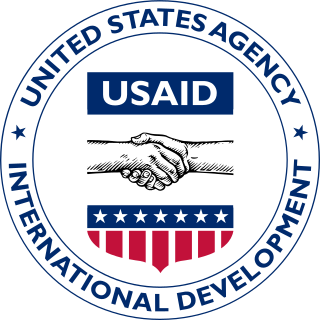
The United States Agency for International Development (USAID) is an independent agency of the U.S. federal government that is primarily responsible for administering civilian foreign aid and development assistance. With a budget of over $27 billion, USAID is one of the largest official aid agencies in the world and accounts for more than half of all U.S. foreign assistance—the highest in the world in absolute dollar terms.
The National Council of the Churches of Christ in the USA, usually identified as the National Council of Churches (NCC), is the largest ecumenical body in the United States. NCC is an ecumenical partnership of 38 Christian faith groups in the United States. Its member communions include mainline Protestant, Eastern Orthodox, African-American, evangelical, and historic peace churches. Together, it encompasses more than 100,000 local congregations and 40 million adherents. It began as the Federal Council of Churches in 1908, and expanded through merger with several other ecumenical organizations to become the National Council of Churches in 1950. Its Interim President and General Secretary is Bishop Vashti Murphy McKenzie.

Anti-Slavery International, founded as the British and Foreign Anti-Slavery Society in 1839, is an international non-governmental organisation, registered charity and advocacy group, based in the United Kingdom. It is the world's oldest international human rights organisation, and works exclusively against slavery and related abuses.
A marketing board is an organization created by many producers to try to market their product and increase consumption and thus prices. It can also be defined as an organization set up by a government to regulate the buying and selling of a certain commodity within a specified area. They most commonly exist to help sell farm products such as milk, eggs, beef or tripe and are funded by the farmers or processors of those crops or products. Marketing boards often also receive funding from governments as an agricultural subsidy. The leadership and strategies of the marketing boards are set through votes by the farmers who are members of the board.
The Foreign Agricultural Service (FAS) is the foreign affairs agency with primary responsibility for the United States Department of Agriculture's (USDA) overseas programs – market development, international trade agreements and negotiations, and the collection of statistics and market information. It also administers the USDA's export credit guarantee and food aid programs and helps increase income and food availability in developing nations by mobilizing expertise for agriculturally led economic growth. The FAS mission statement reads, "Linking U.S. agriculture to the world to enhance export opportunities and global food security," and its motto is "Linking U.S. Agriculture to the World."
The Agricultural Marketing Service (AMS) is an agency of the United States Department of Agriculture; it maintains programs in five commodity areas: cotton and tobacco; dairy; fruit and vegetable; livestock and seed; and poultry. These programs provide testing, standardization, grading and market news services for those commodities, and oversee marketing agreements and orders, administer research and promotion programs, and purchase commodities for federal food programs. The AMS enforces certain federal laws such as the Perishable Agricultural Commodities Act and the Federal Seed Act. The AMS budget is $1.2 billion. It is headquartered in the Jamie L. Whitten Building in Washington, D.C.
In the United States, a commodity checkoff program promotes and provides research and information for a particular agricultural commodity without reference to specific producers or brands. It collects funds through a checkoff mechanism that is sometimes called checkoff dollars, from producers of a particular agricultural commodity and uses these funds to promote and do research on that particular commodity. As stated earlier the organizations must promote their commodity in a generic way without reference to a particular producer. Checkoff programs attempt to improve the market position of the covered commodity by expanding markets, increasing demand, and developing new uses and markets. Checkoff programs amount to $750 million per year.
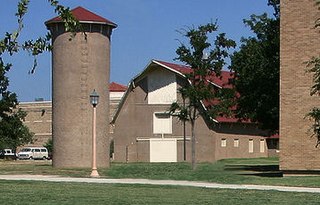
Agricultural education is the teaching of agriculture, natural resources, and land management. At higher levels, agricultural education is primarily undertaken to prepare students for employment in the agricultural sector. Classes taught in an agricultural education curriculum may include horticulture, land management, turf grass management, agricultural science, small animal care, machine and shop classes, health and nutrition, livestock management, and biology.

The Foreign Agents Registration Act (FARA) is a United States law that imposes public disclosure obligations on persons representing foreign interests. It requires "foreign agents"—defined as individuals or entities engaged in domestic lobbying or advocacy for foreign governments, organizations, or persons —to register with the Department of Justice (DOJ) and disclose their relationship, activities, and related financial compensation.
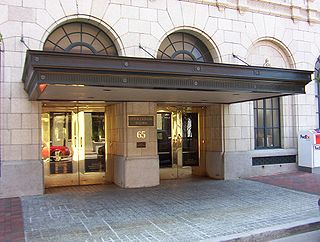
The Memphis Cotton Exchange is located in downtown Memphis, Tennessee, United States, on the corner of Front Street and Union Avenue. It was founded in 1874 as a result of the growing cotton market in Memphis, where trade was strong after the American Civil War. The first Cotton Exchange building was constructed in 1885. It was replaced by the Exchange Building in 1910, which housed it until a newer Cotton Exchange Building was completed in 1925.
In different administrative and organizational forms, the Food for Peace program of the United States has provided food assistance around the world for more than 60 years. Approximately 3 billion people in 150 countries have benefited directly from U.S. food assistance. The Bureau for Humanitarian Assistance within the United States Agency for International Development (USAID) is the U.S. Government's largest provider of overseas food assistance. The food assistance programming is funded primarily through the Food for Peace Act. The Bureau for Humanitarian Assistance also receives International Disaster Assistance Funds through the Foreign Assistance Act (FAA) that can be used in emergency settings.

The National University of Management is a business school in Phnom Penh, Cambodia, located near Phnom Penh Railway Station. The university provides training programmes to all people in the areas of management, economics, commerce, IT, business law, tourism, and foreign languages, accompanied by research and development in response to the needs of the job market.
Title 7 of the United States Code outlines the role of agriculture in the United States Code.
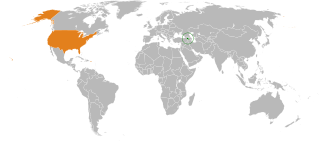
The dissolution of the Soviet Union in December 1991 brought an end to the Cold War and created the opportunity for bilateral relations of the United States with Armenia and other post-Soviet states as they began a political and economic transformation. The United States recognized the independence of Armenia on 25 December 1991, and opened an embassy in the capital city of Armenia, Yerevan in February 1992.

Baker, Donelson, Bearman, Caldwell & Berkowitz P.C. is a large U.S. law firm and lobbying group with offices in the Southeastern United States and Washington, D.C. Fortune has selected Baker Donelson as one of the 100 Best Companies to Work For nine times, citing the firm's commitment to diversity, public service and pro bono work.
United States foreign aid, also known as US foreign assistance consists of a variety of tangible and intangible forms of assistance the United States gives to other countries. Foreign aid is used to support American national security and commercial interests and can also be distributed for humanitarian reasons. Aid is financed from US taxpayers and other revenue sources that Congress appropriates annually through the United States budget process. It is dispersed through "over 20 U.S. government agencies that manage foreign assistance programs," although about half of all economic assistance is channeled through the United States Agency for International Development (USAID).
Based in Washington, D.C., the Global Business Alliance (GBA) formerly known as the Organization for International Investment (OFII) is a trade association representing the interests of US subsidiaries of overseas corporations. OFII advocates for non-discriminatory treatment in the United States for its member companies.
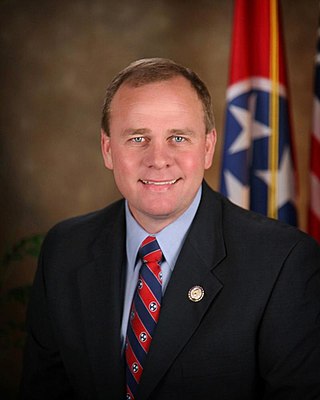
Stephen Lee Fincher is an American politician who was the U.S. representative for Tennessee's 8th congressional district from 2011 to 2017. He is a member of the Republican Party. The seat was vacated by retiring Democratic incumbent John S. Tanner in 2010, and Fincher defeated Democratic Tennessee state senator Roy Herron in the 2010 mid-term Congressional election. Fincher was reelected in 2012 and 2014. On February 1, 2016, he announced that he would not be running for a fourth term. On October 22, 2017, Fincher announced his candidacy for the U.S Senate seat held by outgoing Senator Bob Corker. Fincher withdrew his candidacy in February 2018, instead urging Corker to seek reelection.
References
- 1 2 3 Timothy Curtis Jacobson, George David Smith, Cotton's Renaissance: A Study in Market Innovation, Cambridge, UK: Cambridge University Press, 2001, p. 109
- ↑ National Cotton Council of America: About the National Cotton Council
- ↑ NCC Officers, Board of Directors and Advisors
- ↑ , National Cotton Council of America, February 10, 2014
- 1 2 3 4 5 6 7 8 9 10 11 12 13 14 15 16 17 18 National Cotton Council of America: Timeline
- ↑ Congress, United States. Congressional Record: Proceedings and Debates of the ... Congress. U.S. Government Printing Office. pp. A258.